Sustainable logistics collaboration
PAKi Logistics & Internationale Transporte Scholz

Scholz is a valuable
partner on our journey
to net zero emissions.
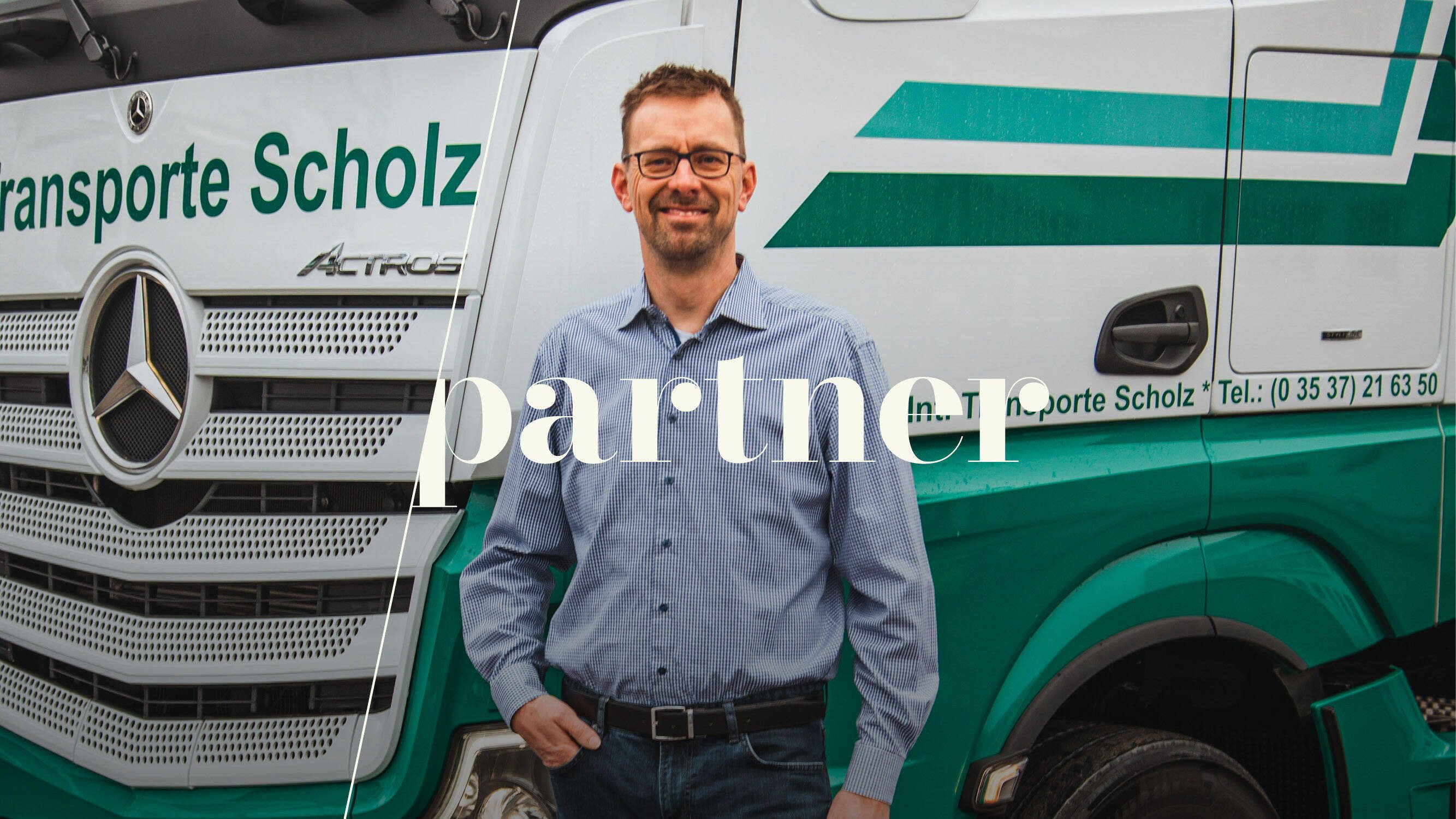
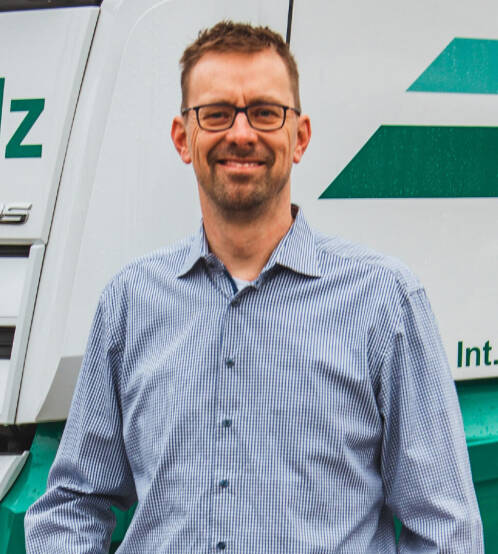
Michael Scholz,
Managing Director & Owner
Internationale Transporte Scholz GmbH
“We will continue to use HVO in the near future. Why should I switch to something else if it works well and benefits the environment?”
Patrick Vorberg
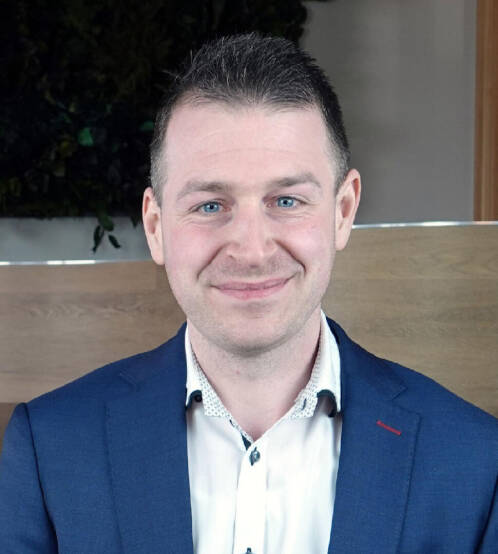
Ribanna Jansen
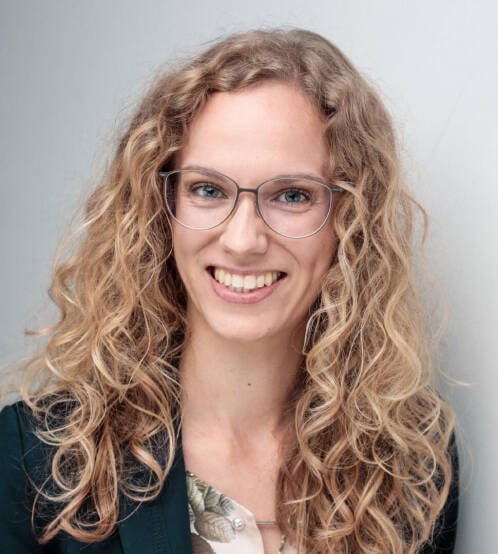
RJ: Mr Scholz, can you briefly tell us about the history and business activities of Internationale Transporte Scholz GmbH?
MS: My father, Gerhard Scholz, founded the company in 1990 as ‘Viehtransporte Gerhard Scholz’. In 2016, I took it over in the second generation and changed the name to ‘Internationale Transporte Scholz GmbH’. Today, we specialise in general cargo and empty pallet transport, with our headquarters in Jessen (Elster), twenty employees and six vehicles.
RJ: How long has the business relationship between PAKi Logistics and Internationale Transporte Scholz GmbH existed?
MS: Since 2012.
PV: Our long-standing partnership with Scholz goes far beyond transport. As a strategic supplier, Scholz also acts as a depot and EPAL licence holder for PAKi.
RJ: What were the main reasons for introducing HVO100?
MS: We wanted to achieve greater sustainability without having to replace the fleet. Utilising existing resources in a more environmentally friendly way corresponds to our understanding of sustainability.
PV: PAKi Logistics is aiming for net zero emissions by 2045. Sustainable logistics solutions such as HVO100 are essential for this. Scholz is a valuable partner on this journey.
RJ: How was HVO100 integrated into the existing fleet?
MS: It wasn't a major change, as the fuel is stored in the same way as diesel and no technical adjustments were necessary.
RJ: Were there any challenges during the changeover?
MS: The certification process took a long time. Otherwise, the changeover went smoothly.
PV: The Scholz company has demonstrated its commitment to sustainability with comparatively little effort and has made long-term investments in a partnership-based supplier relationship with PAKi.
RJ: What impact does the use of HVO100 have on CO2 emissions?
MS: We save around 80 % CO₂e compared to conventional fuels.
RJ: What other environmental benefits does HVO100 offer?
MS: According to the Federal Ministry for Digital and Transport (BMDV), more than 90 % of greenhouse gas emissions can be saved during production. In addition, HVO100 burns more cleanly and with less odour.
RJ: How does the use of HVO100 contribute to achieving sustainability goals?
MS: Our aim is to implement sustainable improvements and fulfil our customers' requirements.
PV: Scholz is our partner with the highest turnover in Germany and has a significant influence on our sustainability strategy. HVO100 is an important intermediate step towards net zero emissions.
RJ: What costs are associated with the changeover?
MS: HVO100 is more expensive. There are tax exemptions, but the price remains higher than diesel.
PV: The prices are 15 to 20 cents higher than diesel. Having our own petrol stations helps to reduce costs.
RJ: What experiences have you had with HVO100?
MS: The performance of the vehicles is unchanged and there has been no negative feedback.
RJ: What further steps are you planning?
MS: We are testing alternative drives such as electric lorries. At the beginning of the year, we purchased weight-reduced trailers with two axles in order to reduce fuel consumption.
RJ: What are your long-term goals?
MS: In 2026, we are planning to purchase an e-Actros 600 from Mercedes-Benz with a range of 550 km. The challenges are the charging infrastructure and the high electricity prices.
PV: E-trucks are essential in the long term. With Scholz, we can test this technology and drive forward sustainable logistics solutions. Our long-standing partnership enables us to successfully implement innovative approaches.
For over a decade, the two companies have enjoyed a close business relationship that goes beyond traditional transport. Together, they focus on sustainable solutions to reduce the carbon footprint in the logistics industry. The introduction of the alternative fuel HVO100 (Hydrotreated Vegetable Oil) is an important milestone on this journey.
PAKi Sustainability Manager Ribanna Jansen has a conversation with Michael Scholz, owner of Internationale Transporte Scholz GmbH and Patrick Vorberg, PAKi Manager Logistics Service DACH & Benelux/Northern Europe. They discuss the background, challenges and successes of this transformation process and show the role that innovative fuel solutions play in sustainable logistics.
The transport and logistics industry is facing the challenge of developing more sustainable solutions to meet increasing environmental requirements. PAKi Logistics GmbH and Internationale Transporte Scholz show how working together in partnership can drive innovative approaches.
Sustainability Progress Report | 2024
Sustainable logistics collaboration
PAKi Logistics & Internationale Transporte Scholz

Scholz is a valuable
partner on our journey
to net zero emissions.
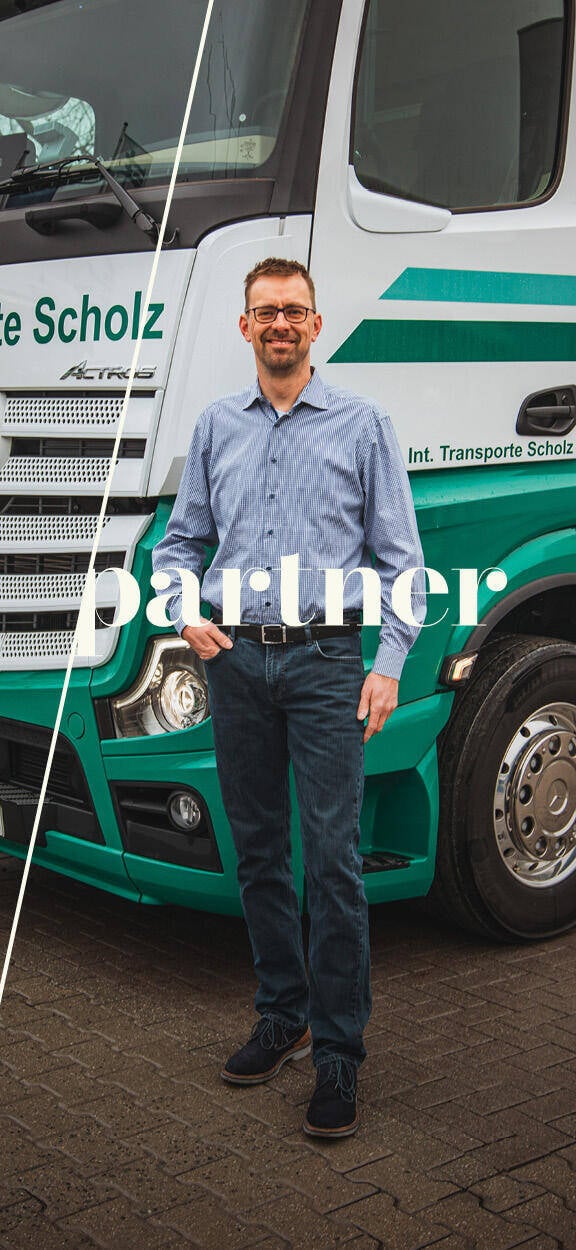

Michael Scholz,
Managing Director & Owner
Internationale Transporte Scholz GmbH
“We will continue to use HVO in the near future. Why should I switch to something else if it works well and benefits the environment?”
Patrick Vorberg

Ribanna Jansen

RJ: Mr Scholz, can you briefly tell us about the history and business activities of Internationale Transporte Scholz GmbH?
MS: My father, Gerhard Scholz, founded the company in 1990 as ‘Viehtransporte Gerhard Scholz’. In 2016, I took it over in the second generation and changed the name to ‘Internationale Transporte Scholz GmbH’. Today, we specialise in general cargo and empty pallet transport, with our headquarters in Jessen (Elster), twenty employees and six vehicles.
RJ: How long has the business relationship between PAKi Logistics and Internationale Transporte Scholz GmbH existed?
MS: Since 2012.
PV: Our long-standing partnership with Scholz goes far beyond transport. As a strategic supplier, Scholz also acts as a depot and EPAL licence holder for PAKi.
RJ: What were the main reasons for introducing HVO100?
MS: We wanted to achieve greater sustainability without having to replace the fleet. Utilising existing resources in a more environmentally friendly way corresponds to our understanding of sustainability.
PV: PAKi Logistics is aiming for net zero emissions by 2045. Sustainable logistics solutions such as HVO100 are essential for this. Scholz is a valuable partner on this journey.
RJ: How was HVO100 integrated into the existing fleet?
MS: It wasn't a major change, as the fuel is stored in the same way as diesel and no technical adjustments were necessary.
RJ: Were there any challenges during the changeover?
MS: The certification process took a long time. Otherwise, the changeover went smoothly.
PV: The Scholz company has demonstrated its commitment to sustainability with comparatively little effort and has made long-term investments in a partnership-based supplier relationship with PAKi.
RJ: What impact does the use of HVO100 have on CO2 emissions?
MS: We save around 80 % CO₂e compared to conventional fuels.
RJ: What other environmental benefits does HVO100 offer?
MS: According to the Federal Ministry for Digital and Transport (BMDV), more than 90 % of greenhouse gas emissions can be saved during production. In addition, HVO100 burns more cleanly and with less odour.
RJ: How does the use of HVO100 contribute to achieving sustainability goals?
MS: Our aim is to implement sustainable improvements and fulfil our customers' requirements.
PV: Scholz is our partner with the highest turnover in Germany and has a significant influence on our sustainability strategy. HVO100 is an important intermediate step towards net zero emissions.
RJ: What costs are associated with the changeover?
MS: HVO100 is more expensive. There are tax exemptions, but the price remains higher than diesel.
PV: The prices are 15 to 20 cents higher than diesel. Having our own petrol stations helps to reduce costs.
RJ: What experiences have you had with HVO100?
MS: The performance of the vehicles is unchanged and there has been no negative feedback.
RJ: What further steps are you planning?
MS: We are testing alternative drives such as electric lorries. At the beginning of the year, we purchased weight-reduced trailers with two axles in order to reduce fuel consumption.
RJ: What are your long-term goals?
MS: In 2026, we are planning to purchase an e-Actros 600 from Mercedes-Benz with a range of 550 km. The challenges are the charging infrastructure and the high electricity prices.
PV: E-trucks are essential in the long term. With Scholz, we can test this technology and drive forward sustainable logistics solutions. Our long-standing partnership enables us to successfully implement innovative approaches.
For over a decade, the two companies have enjoyed a close business relationship that goes beyond traditional transport. Together, they focus on sustainable solutions to reduce the carbon footprint in the logistics industry. The introduction of the alternative fuel HVO100 (Hydrotreated Vegetable Oil) is an important milestone on this journey.
PAKi Sustainability Manager Ribanna Jansen has a conversation with Michael Scholz, owner of Internationale Transporte Scholz GmbH and Patrick Vorberg, PAKi Manager Logistics Service DACH & Benelux/Northern Europe. They discuss the background, challenges and successes of this transformation process and show the role that innovative fuel solutions play in sustainable logistics.
The transport and logistics industry is facing the challenge of developing more sustainable solutions to meet increasing environmental requirements. PAKi Logistics GmbH and Internationale Transporte Scholz show how working together in partnership can drive innovative approaches.
Sustainability Progress Report | 2024